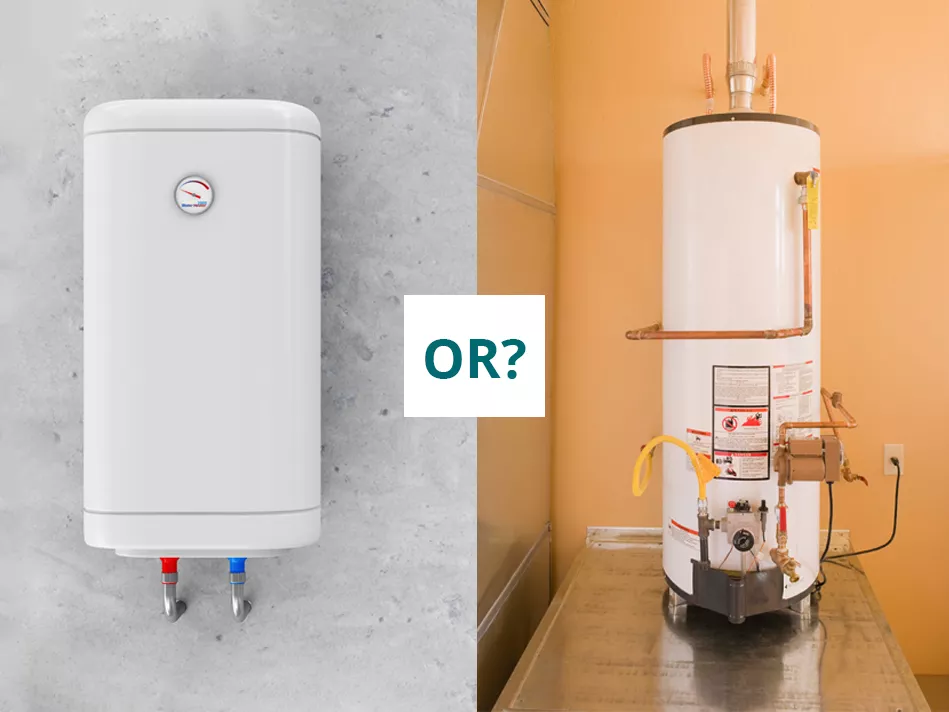Wherever you live, having hot water readily available makes life much easier and more convenient. Whether you prefer gas or electric, we’ll explore the pros and cons of water heaters with and without a tank to help you decide if going tankless is right for you.
What does a water heater do?
A water heater’s purpose is to take water that comes in from your home’s plumbing system (which it’s connected to) and make and/or keep it hot for uses like showering, washing dishes, and doing laundry. Some more modern water heaters are connected to the home’s HVAC system, but the outcome is the same.
How water gets hot
For electric and gas hot water tanks, the water passing through the system is made hot by the heating elements or the burner, respectively. Electric water heaters are typically hooked up to electricity through a junction box on the top of the tank, while their gas counterparts use a pilot light.
If your water heater has a tank, warmer water rises to the top, where it can be carried through your home’s plumbing. If you have a tankless model, it functions like a smaller version of the traditional hot water tank; it heats water right as it passes through the heat exchanger, eliminating having to wait for enough to water get hot. The main difference between the two is that the tankless option does not produce or store any reserves of hot water.
When you adjust your hot and cold controls, you mix heated water with water from the cold supply line, which changes the temperature of the water when it comes through the tap.
Pro Tip: If you haven’t laid eyes on your water heater lately, they can typically be found in garages, attics, basements, or sometimes, even in their own closets!

Pros and cons breakdown: Water heater types
Now that we’ve established how your home has hot water on demand, let’s get down to business: What makes each one special?
Traditional water heater benefits
Though water heaters with tanks have been widely available since the 1930s, they still have plenty to offer in the modern era. A traditional tank water heater has two main functions – making water hot and maintaining a supply of hot water. This means you’ve got hot water reserves, which can be a welcome comfort in a time of emergency. Traditional water heaters can also:
- More easily support simultaneous hot water demand from multiple appliances
- Work better in colder climates (especially if it’s gas)
- Save you stress, money, and time with more available parts and more straightforward repairs

Tankless water heater benefits
Tankless water heaters are considered by some to be a great solution, but no home appliance is perfect. Not having stored hot water available means you may be relegated to cold showers in an emergency, or you could have to decide which home appliance should be run first. On the plus side, tankless water heaters can:
- Take up much less space in your home
- Reduce your energy costs
- Give you a virtually endless supply of hot water in your daily life
How to determine which type of water heater is right for you
Each type of hot water heater comes with its own list of pros and cons; only you can determine if a tankless or tank water heater is best home water heater for your household’s needs. When deciding which one is a better fit for you, ask yourself the following questions:
- How often are multiple water-centric appliances used at one time?
- Is my water heater easily accessible for repairs?
- What is my budget for water heater replacement?

Tank or tankless, how much does a water heater cost?
When considering a new water heater, factor in the following stats.
Tankless water heater cost
According to Angi, tankless water heaters can cost about $600 for an electric model, and just north of $1,000 if the unit is gas. Depending on factors such as size, fuel source, and if you’re switching from tank to tankless, installation could be another $1,100-$3,400.
Pro Tip: If you opt to go tankless, you may be eligible for certain discounts and credits. Check with your utility provider and the manufacturer for ways to make the install more affordable.
Traditional water heater cost
The cost to purchase and install a new traditional water heater can range from $550 for the most inexpensive 30-gallon tank, to over $3,500 for a high-end, 80-gallon model, which would likely be electric (Tank size ranges from 20 to 100 gallons.). Additional costs may come from:
- Removing or replacing components to switch the fuel source
- Selecting a gas hot water heater with venting
- Choosing to install a larger unit
Pro Tip: Visit manufacturer websites, or contact an area professional to confirm the right size water heater for your home.
So – what’d you decide? Are you saving time by going tankless, or is a large supply of hot water more in line with what matters to you most? Let us know on Instagram or Facebook!

